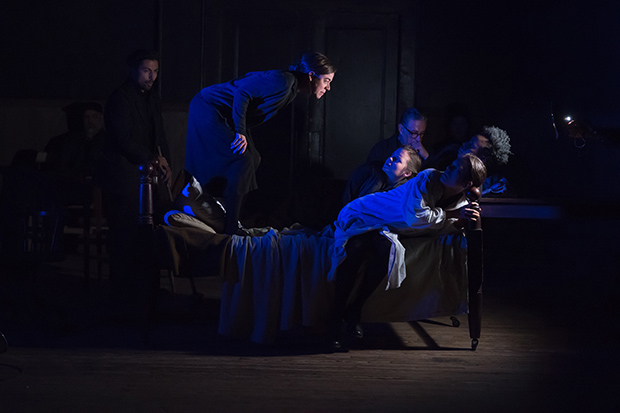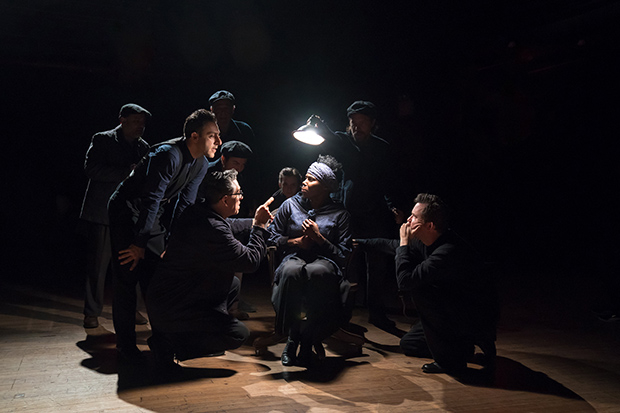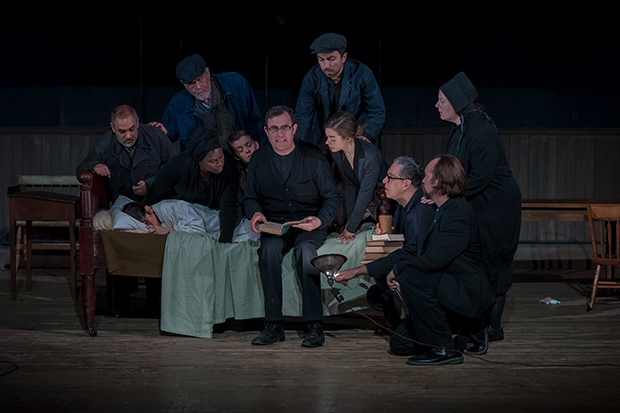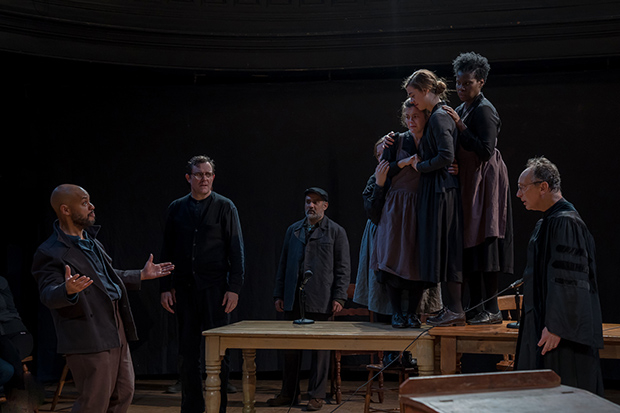The Crucible Conjures the Moral Panic That Fuses American Generations Together

(© Ashley Garrett)
This time of year, Americans recount the dubious tale of the first Thanksgiving at Plymouth Colony as a foundational myth of the American spirit — specifically, our gratitude and love of community. But in another New England community seven decades later, something happened that paints a more honest portrait of our national character: the Salem witch trials. From early Massachusetts to McCarthyism to #MeToo, moral panic has been a recurring theme in America as we jealously guard our shining city upon a hill. The paranoia that fuels it knows no creed or political ideology. Whenever we triumph over moral panic in one form, it seems to shapeshift into another.
Arriving just in time to provide a counter-narrative to Thanksgiving, Bedlam is now reviving Arthur Miller's The Crucible at the Connelly Theater. Simultaneously austere and evocative, this staging by director Eric Tucker reveals a play as terrifyingly relevant as it was during its 1953 debut.

(© Ashley Garrett)
Based on real events, The Crucible takes place in 1692 Salem. Reverend Parris (an infuriatingly self-satisfied Randolph Curtis Rand) is distraught over the sudden illness of his daughter, whom he discovered dancing in the forest with her cousin Abigail (Truett Felt, unpacking both the malice and vulnerability of her character). Fearing witchcraft, he summons an expert on the subject: Reverend Hale (Eric Tucker, whose disappearing voice nicely underlines Hale's loss of control). As Hale investigates, an ever-increasing number of townspeople are denounced as witches. Hale begins to suspect that personal animosity is playing a part in these accusations, especially in the case of John Proctor (Ryan Quinn).
No fan of Parris, Proctor regularly skips church to plow his fields — two big no-nos. He also had an affair with Abigail when she worked in his house, leading his wife, Elizabeth (a stern yet wounded Susannah Millonzi), to dismiss her. When Abigail denounces Elizabeth as a witch, it is perfectly clear to John what is happening. But will it be clear to Deputy Governor Danforth (an imperious Paul Lazar) as his court decides which of the accused lives or dies?

(© Ashley Garrett)
The disorienting whirlwind of Miller's drama begins from the moment we enter the theater, which has been turned completely around so that the bulk of the audience sits within the proscenium, facing the entrance (the remainder circles the playing space like we're in a meeting house). John McDermott's set uses the ground and mezzanine levels of the house, allowing for surprisingly expansive blocking, with actors all around us. At one point, Hale lurks in the shadows as he witnesses a heated argument in the Proctor home. Les Dickert creates plenty of shadows for malevolent spirits and Salemites with his resourceful lighting.
Charlotte Palmer-Lane costumes the actors in dark blacks, grays, and blues, suggesting Puritan austerity without making this a strictly period affair. Most of these clothes look like they could have been selected from the saddest discount rack at H&M (collarless shirts are less a fashion statement than a repudiation of the decadence represented by collars).
Tucker's staging supercharges an already electric script. During the court scenes, the direction of the furniture physically morphs with terrifying speed, as the actors whip past us with a chair or table. We feel the wind on our faces and wonder if we too will be swept up by this violent cyclone masquerading as justice.

(© Ashley Garrett)
Quinn's stirring portrayal of Proctor is the beating heart of the production. An everyman with all of the inherent flaws, he tries to keep himself collected as the whole world loses its mind around him. By the end, he tremors with rage, upbraiding a system that is as unjust as it is ridiculous. Standing before Danforth and his bench, he holds his arms out as if to halt a stampede and asks, "Is the accuser always holy now?" It's a question that plenty of Americans have asked in the last two years, as unsubstantiated accusations have become proof enough in the court of public opinion.
While witch hunters have appeared throughout American history, so have those who would defy them. When things get heavy, they call for more weight. That enduring rebel spirit is something for which we should all be thankful, in this and every season.











